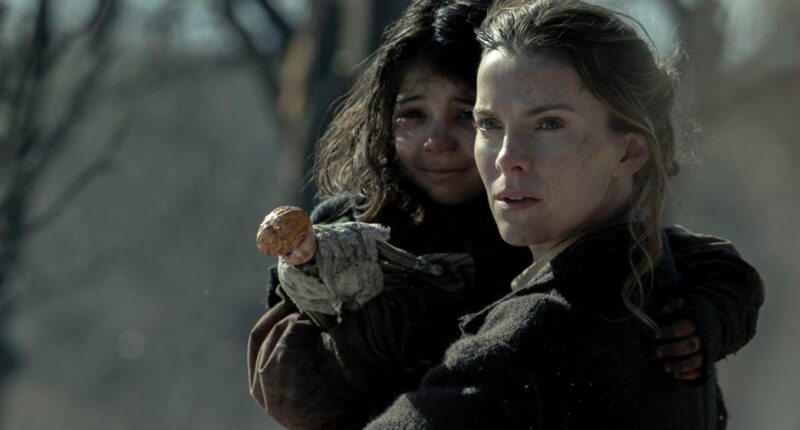The third episode of American Primeval is a crucial point in Sara Rowell’s journey. Until now, Sara has tried to maintain a sense of decorum despite the harsh wilderness around her. Guided by her moral compass, she leads her small group consisting of her son Devin, guide Isaac, and companion Two Moons off the beaten path to assist a young French Canadian girl. Despite Isaac’s warnings to leave the girl be, Sara follows her instincts, a decision that ultimately proves to be a mistake.
What follows is traumatic episode that culminates in Sara “finding her inner ‘American primeval,’” according to series star Betty Gilpin.
**Spoilers for American Primeval, now streaming on Netflix**
American Primeval, a recent addition to Netflix’s western genre, is helmed and executive produced by Peter Berg, known for his work on Friday Night Lights and Painkiller. The series is set in 1857 Utah Territory, a volatile region where conflicts between white American settlers, local Indigenous tribes, and Mormons were frequent. Sara Rowell, a wealthy woman from the east coast, is on the run with her son Devin after she killed her affluent but abusive husband. Their journey westward is driven by Sara’s desire to reunite with Devin’s biological father.
Despite Isaac Reed’s repeated interventions on behalf of Sara and Devin in the initial episodes of American Primeval, Sara remains resistant to his counsel. When she encounters a lost French Canadian girl along the trail, Sara is determined to escort her back to safety. However, what awaits them is not a grateful family but a group of seemingly barbaric French Canadians who are revealed to be cannibals preying on unsuspecting victims.
Captured by these fiends, Sara soon surrenders herself to sexual assault to save her son from death or torture. When an opening to fight back — courtesy of an escaped and returned Two Moons — arises, Sara viciously murders almost the entire camp.
“I think for Sara, her arc is sort of, you know, kind of finding her her inner ‘American primeval,’” Gilpin said. “I think that when we meet her, she’s pretty buttoned up and prim and proper and terrified in this environment. But we know she has this secret.”
The secret being she’s already killed a man.
“What I tried to think about is that maybe the external elements of this world that is so foreign to the world that she grew up in, even though it is terrifying and new to her, that actually it is a closer match to what she feels inside as a person,” Gilpin said. “This experience that she has —this horrible, traumatic experience at this camp in Episode 3 — unlocks those inner elements that she is living in in this series.”
“It’s sort of like her insides match her outsides at that point.”
Gilpin went on to explain that even though she lives in 2024 and doesn’t “have the same constraints as a woman in 1857,” she still found common ground with Sara in these visceral moments.
“I am a mom and I feel that as a mom, you’re suddenly feeling these roiling, tribal, ‘scream at the sky’ feelings that don’t match the quiet, buttoned up circumstances of daily life,” Gilpin said. “There are experiences that sort of catapult you into feeling what you feel on the inside and I think that’s sort of what we see Sara go through.”
Gilpin might have been able to see the truth in Sara’s journey in American Primeval Episode 3, but were there truly bands of comically evil Quebecois lurking in the Utah Territory in the 1850s? “Yes,” American Primeval director and EP Peter Berg said.
“We did quite a bit of research when we were putting together the scripts and one of the things that [series writer] Mark L. Smith found were that there were groups of French Canadians — no disrespect to French or Canadians — but there were different groups of French Canadians who had drifted into this part of America in 1857, in that time period, and were just sort of living off the land,” Berg said.
“Some of whom in our mind may have been a bit nefarious and may not have been the ideal folks that you wanted to run into accidentally or on purpose at any time. And unfortunately, some of our characters do run into some of these folks.”
They run into “these folks” and are forever changed — at least, in Sara’s case.
(function(d, s, id) {
var js, fjs = d.getElementsByTagName(s)[0];
if (d.getElementById(id)) return;
js = d.createElement(s); js.id = id;
js.src = “//connect.facebook.net/en_US/sdk.js#xfbml=1&appId=823934954307605&version=v2.8”;
fjs.parentNode.insertBefore(js, fjs);
}(document, ‘script’, ‘facebook-jssdk’));

















